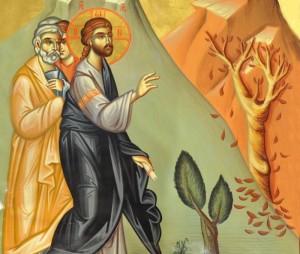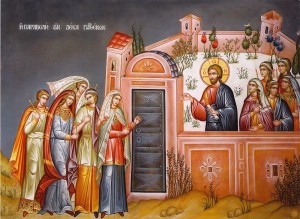Jesus Is Not Always Nice
During Holy Week, we are preparing for Pascha (Easter), the glorious Resurrection. We celebrated the joy of Palm Sunday, when the Lord came to Jerusalem in glory, and we look forward to Christ rising from the dead. For those of us who don’t attend Church frequently or read the Bible with any regularity, it’s easy to see Jesus as some type of divine life coach, or a Santa Clause type figure, helping us get what we need to make it through life and always being available to listen to our prayers when we need Him. The Jesus of our imagining is all about love, doesn’t like judgmental people, and always understands our problems and why we had to cut corners to get where we were going…
While it’s true that Jesus is loving, understanding, and always there for us, His dislike of judgementalism in us partly stems from the fact that He is ultimately the judge, and when we judge, we are taking that on ourselves instead of letting Him do it. Jesus’ love is always present, but when we reject His love by sinning, we experience His love as correction at first (like when a parent disciplines his child), then as chastisement (the tough-love approach), and finally He allows us to go away fully, at which point we are under judgment. The Holy Scriptures make this clear, and the Church chooses to read these Gospel lessons during Holy Week to drive home the point: following Christ is a relationship, a commitment, there are expectations, and we will be judged on the choices we make and how we perform.
On Holy Monday, we commemorate the withering of the fig tree:
Now in the morning as he returned into the city, he hungered. And when he saw a fig tree in the way, he came to it, and found nothing thereon, but leaves only, and said unto it, Let no fruit grow on thee henceforward for ever. And presently the fig tree withered away. And when the disciples saw it, they marvelled, saying, How soon is the fig tree withered away! Jesus answered and said unto them, Verily I say unto you, If ye have faith, and doubt not, ye shall not only do this which is done to the fig tree, but also if ye shall say unto this mountain, Be thou removed, and be thou cast into the sea; it shall be done. And all things, whatsoever ye shall ask in prayer, believing, ye shall receive (Matthew 21:18-22).
The Church hymns give an interpretation:
O brethren, let us fear the punishment of the fig tree, withered because it was unfruitful; and let us bring worthy fruits of repentance unto Christ, who grants us His great mercy (3rd Aposticha from Bridegroom Matins).
On Holy Tuesday, we commemorate the Parable of the Ten Virgins:
Then shall the kingdom of heaven be likened unto ten virgins, which took their lamps, and went forth to meet the bridegroom. And five of them were wise, and five were foolish. They that were foolish took their lamps, and took no oil with them: But the wise took oil in their vessels with their lamps. While the bridegroom tarried, they all slumbered and slept. And at midnight there was a cry made, Behold, the bridegroom cometh; go ye out to meet him. Then all those virgins arose, and trimmed their lamps. And the foolish said unto the wise, Give us of your oil; for our lamps are gone out. But the wise answered, saying, Not so; lest there be not enough for us and you: but go ye rather to them that sell, and buy for yourselves. And while they went to buy, the bridegroom came; and they that were ready went in with him to the marriage: and the door was shut. Afterward came also the other virgins, saying, Lord, Lord, open to us. But he answered and said, Verily I say unto you, I know you not. Watch therefore, for ye know neither the day nor the hour wherein the Son of man cometh (Matthew 25:1-13).
Again, the Church offers an interpretation for how we should apply this:
Behold the Bridegroom comes in the middle of the night; and blessed is the servant whom He shall find watching, but unworthy is he whom He shall find in slothfulness. Beware then, O my soul, and be not overcome by sleep, lest thou be given over to death and shut out from the Kingdom. But return to soberness and cry aloud: Holy, holy, holy art Thou, O God: through the Theotokos have mercy upon us (Dismissal Hymn of Bridegroom Matins).
Jesus is always loving, but not always nice, because if He were always “nice” like we often imagine, we would not be challenged to trust in Him alone and not ourselves, and to follow through with that faith by bearing fruit. Instead of filing away this fact in the back of our minds, or trying to synthesize it with the various other opinions we have about God, let’s go to the Bible, read it, begin attending Church regularly, and actually take things on God’s Word, instead of our opinions. Otherwise we may end up like the fig tree, or the foolish virgins.




